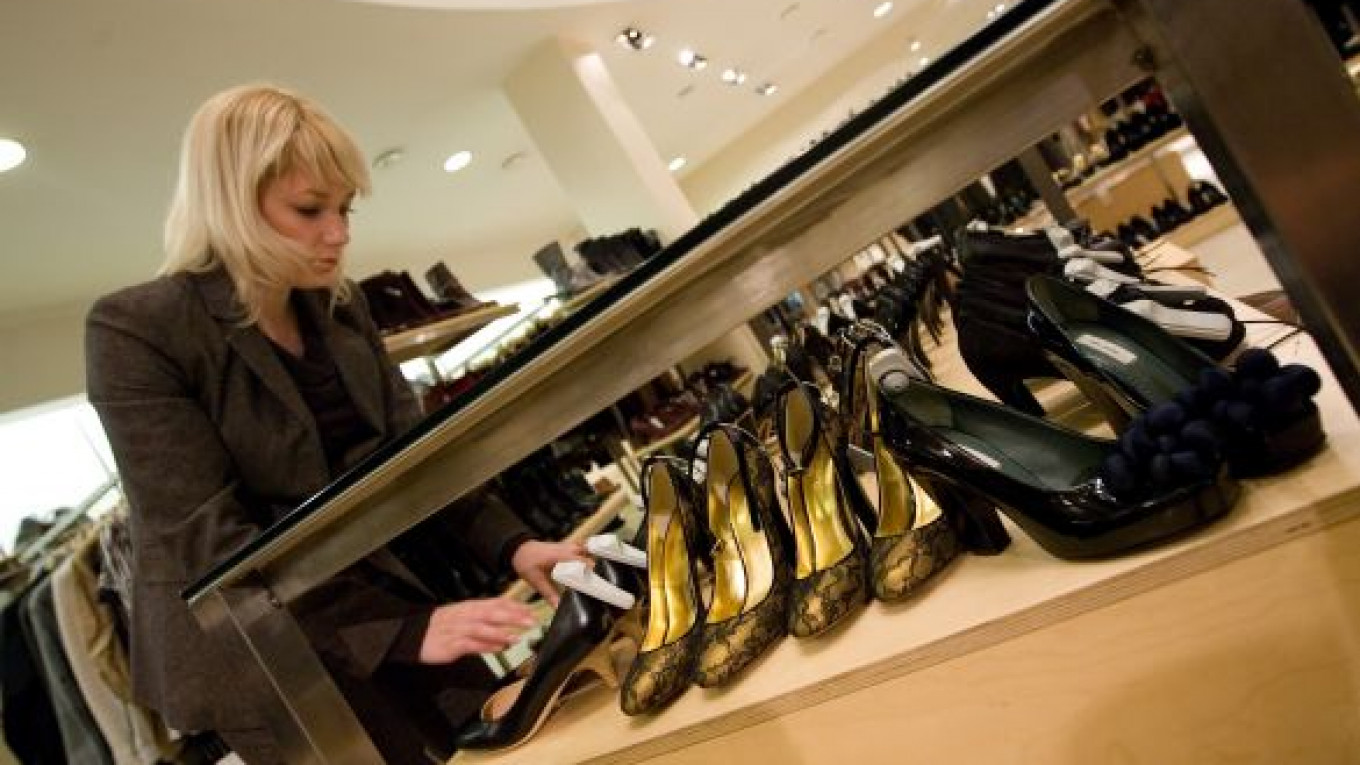Shoe retailers in Russia including Ekonika and Ralf Ringer are focusing on women because male clients are buying less than half as much footwear as their female counterparts — and at lower prices.
The footwear chain Ekonika decided to stop carrying men's shoes starting next year. "The share of men's footwear in our stores has fallen. Three years ago it was 30-to-70, while over the last year it has been 20-to-80," said Sergei Sarkisov, a vice president at Ekonika.
In 2008, the company was looking for ways to boost efficiency and conducted an experiment. The chain stopped carrying part of its men's line and found that the smaller selection had no effect on sales, Sarkisov said. By eliminating men's shoes altogether, Ekonika hopes to focus on its key clients and expand its offering of accessories, particularly purses.
Women are better shoppers because they buy more expensive shoes and far more often than men, he said. Thanks to female customers, Ekonika's sales volume fell just 7 percent last year, while the overall market dropped 15 percent to 20 percent, Sarkisov said. This year, same-store sales volumes will be up about 5 percent to 6 percent, he added.
Sales of women's footwear is 100 percent to 150 percent higher than men's shoes, said Andrei Berezhnoi, chief executive of Ralf Ringer.
Demand among men fell less during the crisis because male customers usually look to buy new shoes when their old ones have worn out. Researchers from the company Komkon found that women significantly cut back on their shoe purchases during the downturn.
In 2008, 27.9 percent of women bought new shoes and 23 percent purchased winter boots, while a year later the figures fell to 22.5 percent and 21.1 percent, respectively. Meanwhile, the number of men purchasing shoes fell from 24.3 percent to 20.6 percent and those purchasing boots was virtually unchanged, falling to 15 percent from 15.1 percent.
But women are still buying more footwear, and the margin on women's shoes is higher than for men's shoes, Berezhnoi said, declining to elaborate.
Ralf Ringer, which for more than 10 years was exclusively focused on men, has given in and began selling women's shoes and boots in September, although for now just eight models. Berezhnoi said he hoped to eventually turn Ralf Ringer into a full-fledged shoe chain, with the women's collection accounting for up to 70 percent of stores' assortments.
Men's footwear is not always less profitable than women's, said Anton Titov, chief executive of Obuv Rossii.
"The men's collection doesn't have to be completely changed four times a year, and one model may sell well for several years. That means you can order a large shipment and reap savings that way," he said.
Titov said the Vestfalika chain, which is owned by Obuv Rossii, carries about 20 percent men's footwear. "But we're strengthening in this segment and hope to raise the share to 30 percent," he said.
Russians still buy fewer shoes than Europeans. According to data from the Russian Leather and Shoe Workers Union, the market fell 20 percent last year to 280 million pairs of shoes, or roughly two pairs for each person in Russia. The union noted that Europeans annually buy an average of 4.5 pairs annually, while Americans take home 6.5 pairs per year.
A Message from The Moscow Times:
Dear readers,
We are facing unprecedented challenges. Russia's Prosecutor General's Office has designated The Moscow Times as an "undesirable" organization, criminalizing our work and putting our staff at risk of prosecution. This follows our earlier unjust labeling as a "foreign agent."
These actions are direct attempts to silence independent journalism in Russia. The authorities claim our work "discredits the decisions of the Russian leadership." We see things differently: we strive to provide accurate, unbiased reporting on Russia.
We, the journalists of The Moscow Times, refuse to be silenced. But to continue our work, we need your help.
Your support, no matter how small, makes a world of difference. If you can, please support us monthly starting from just $2. It's quick to set up, and every contribution makes a significant impact.
By supporting The Moscow Times, you're defending open, independent journalism in the face of repression. Thank you for standing with us.
Remind me later.






